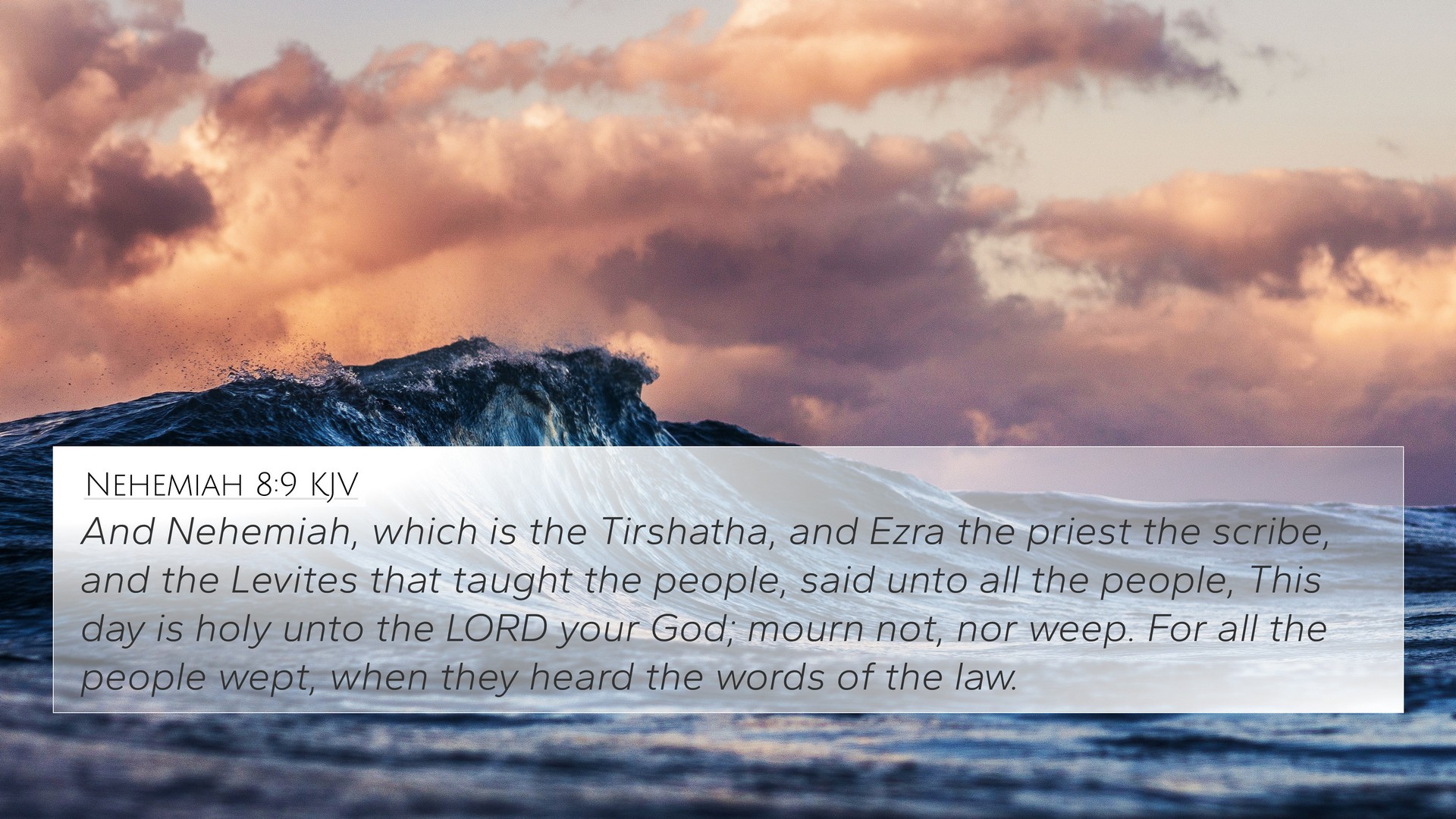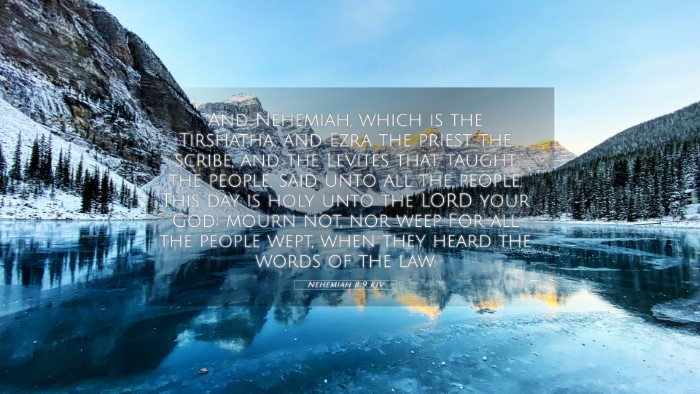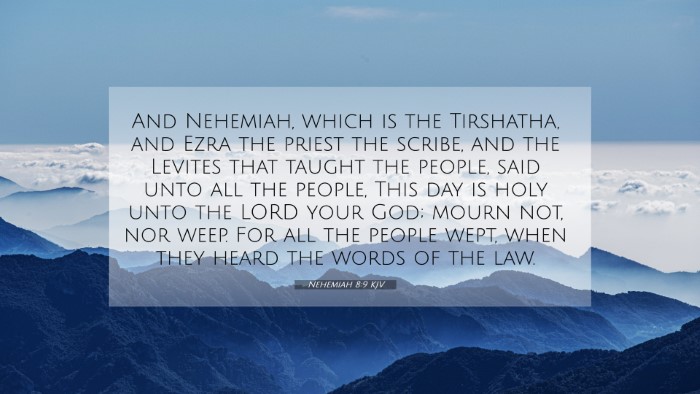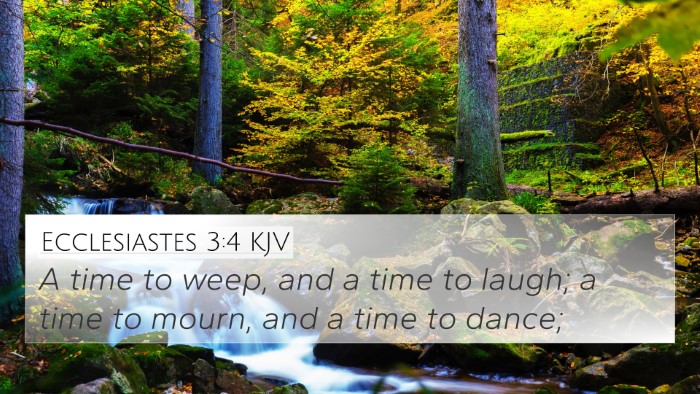Old Testament
Genesis Exodus Leviticus Numbers Deuteronomy Joshua Judges Ruth 1 Samuel 2 Samuel 1 Kings 2 Kings 1 Chronicles 2 Chronicles Ezra Nehemiah Esther Job Psalms Proverbs Ecclesiastes Song of Solomon Isaiah Jeremiah Lamentations Ezekiel Daniel Hosea Joel Amos Obadiah Jonah Micah Nahum Habakkuk Zephaniah Haggai Zechariah MalachiNehemiah 8:9 Similar Verses
Nehemiah 8:9 Cross References
And Nehemiah, which is the Tirshatha, and Ezra the priest the scribe, and the Levites that taught the people, said unto all the people, This day is holy unto the LORD your God; mourn not, nor weep. For all the people wept, when they heard the words of the law.
Uncover the Rich Themes and Topics of This Bible Verse
Listed below are the Bible themes associated with Nehemiah 8:9. We invite you to explore each theme to gain deeper insights into the Scriptures.
Nehemiah 8:9 Cross Reference Verses
This section features a detailed cross-reference designed to enrich your understanding of the Scriptures. Below, you will find carefully selected verses that echo the themes and teachings related to Nehemiah 8:9 KJV. Click on any image to explore detailed analyses of related Bible verses and uncover deeper theological insights.

Nehemiah 7:70 (KJV) »
And some of the chief of the fathers gave unto the work. The Tirshatha gave to the treasure a thousand drams of gold, fifty basons, five hundred and thirty priests' garments.
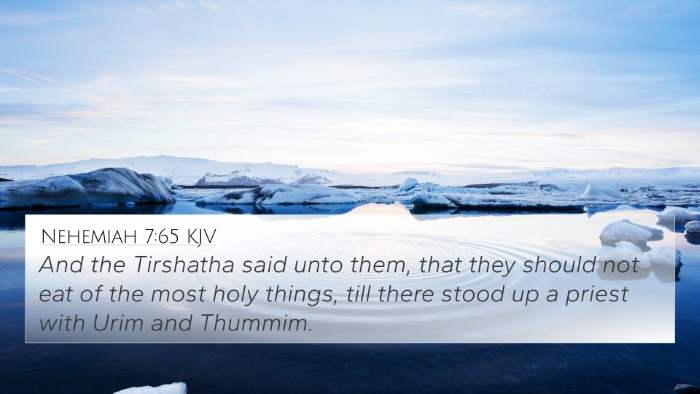
Nehemiah 7:65 (KJV) »
And the Tirshatha said unto them, that they should not eat of the most holy things, till there stood up a priest with Urim and Thummim.
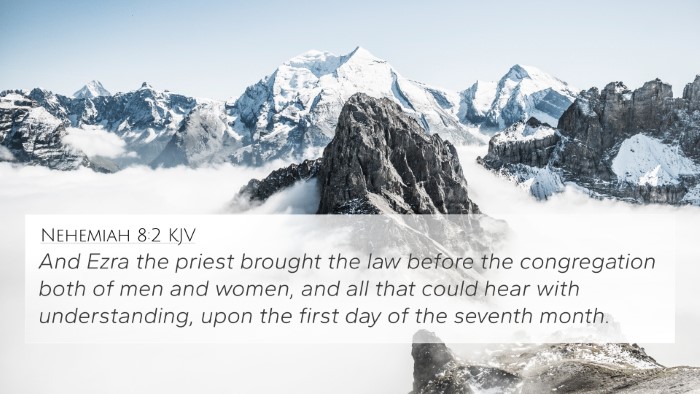
Nehemiah 8:2 (KJV) »
And Ezra the priest brought the law before the congregation both of men and women, and all that could hear with understanding, upon the first day of the seventh month.

Deuteronomy 12:7 (KJV) »
And there ye shall eat before the LORD your God, and ye shall rejoice in all that ye put your hand unto, ye and your households, wherein the LORD thy God hath blessed thee.
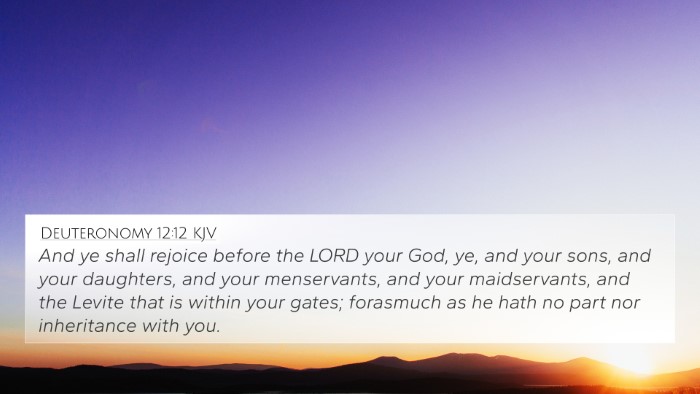
Deuteronomy 12:12 (KJV) »
And ye shall rejoice before the LORD your God, ye, and your sons, and your daughters, and your menservants, and your maidservants, and the Levite that is within your gates; forasmuch as he hath no part nor inheritance with you.
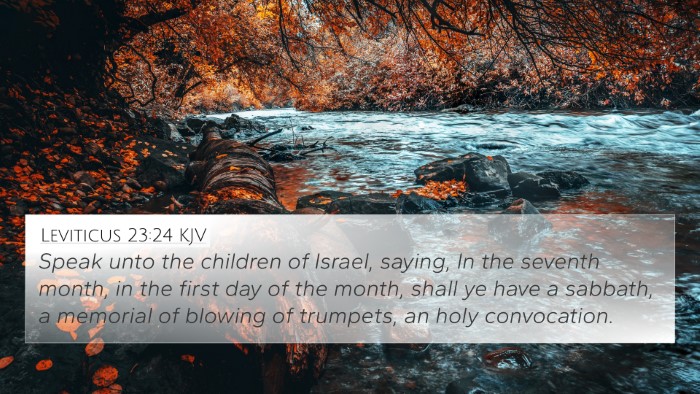
Leviticus 23:24 (KJV) »
Speak unto the children of Israel, saying, In the seventh month, in the first day of the month, shall ye have a sabbath, a memorial of blowing of trumpets, an holy convocation.
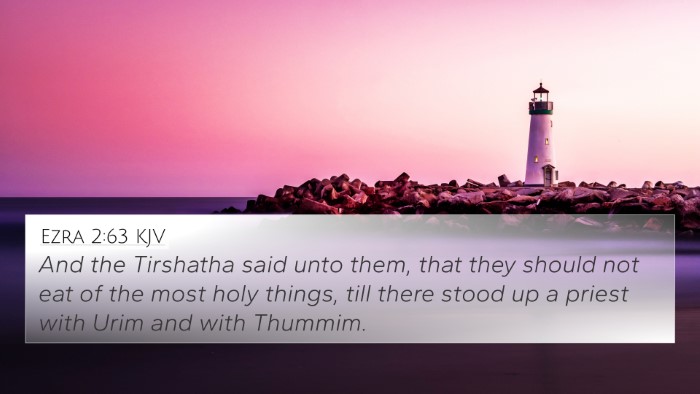
Ezra 2:63 (KJV) »
And the Tirshatha said unto them, that they should not eat of the most holy things, till there stood up a priest with Urim and with Thummim.
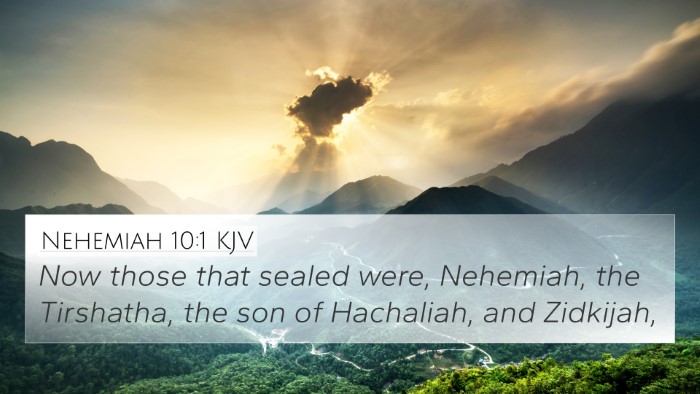
Nehemiah 10:1 (KJV) »
Now those that sealed were, Nehemiah, the Tirshatha, the son of Hachaliah, and Zidkijah,
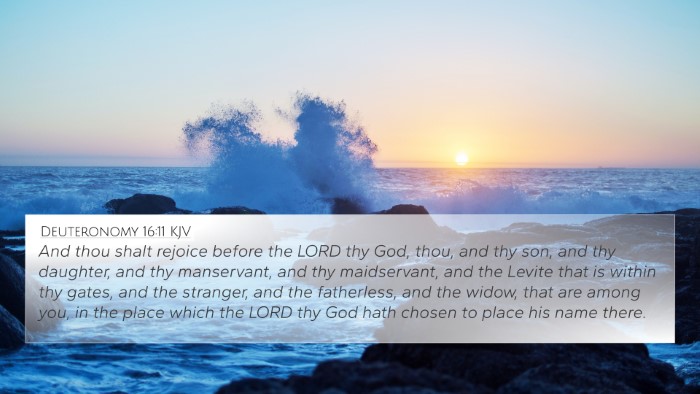
Deuteronomy 16:11 (KJV) »
And thou shalt rejoice before the LORD thy God, thou, and thy son, and thy daughter, and thy manservant, and thy maidservant, and the Levite that is within thy gates, and the stranger, and the fatherless, and the widow, that are among you, in the place which the LORD thy God hath chosen to place his name there.
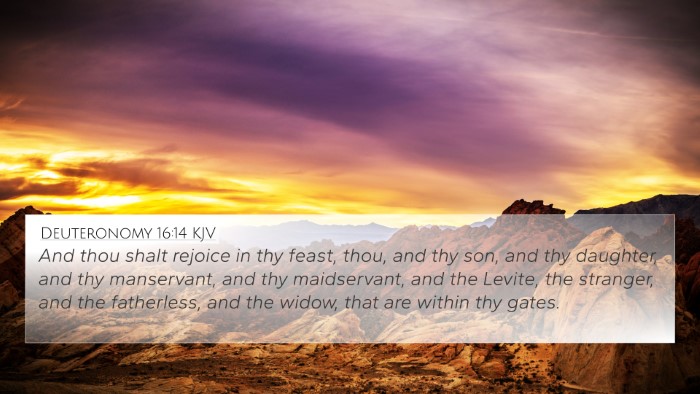
Deuteronomy 16:14 (KJV) »
And thou shalt rejoice in thy feast, thou, and thy son, and thy daughter, and thy manservant, and thy maidservant, and the Levite, the stranger, and the fatherless, and the widow, that are within thy gates.
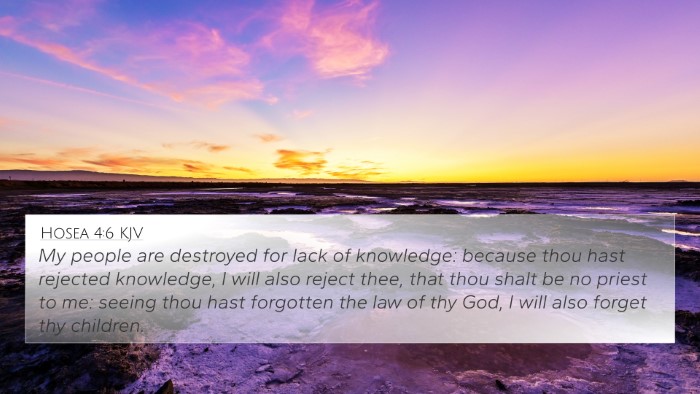
Hosea 4:6 (KJV) »
My people are destroyed for lack of knowledge: because thou hast rejected knowledge, I will also reject thee, that thou shalt be no priest to me: seeing thou hast forgotten the law of thy God, I will also forget thy children.

Malachi 2:13 (KJV) »
And this have ye done again, covering the altar of the LORD with tears, with weeping, and with crying out, insomuch that he regardeth not the offering any more, or receiveth it with good will at your hand.
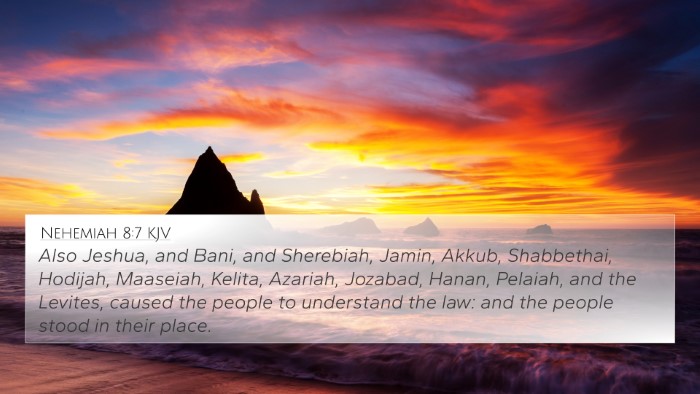
Nehemiah 8:7 (KJV) »
Also Jeshua, and Bani, and Sherebiah, Jamin, Akkub, Shabbethai, Hodijah, Maaseiah, Kelita, Azariah, Jozabad, Hanan, Pelaiah, and the Levites, caused the people to understand the law: and the people stood in their place.
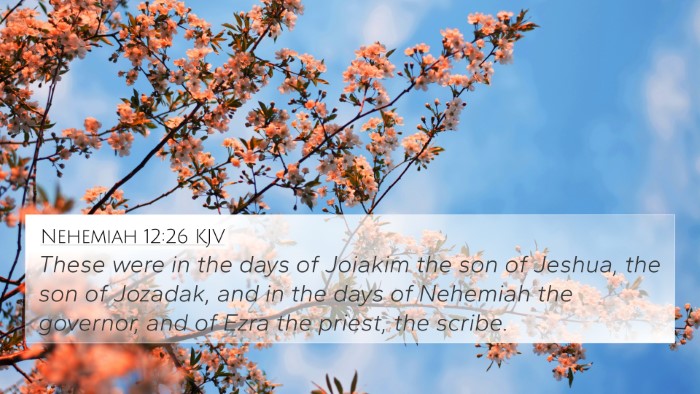
Nehemiah 12:26 (KJV) »
These were in the days of Joiakim the son of Jeshua, the son of Jozadak, and in the days of Nehemiah the governor, and of Ezra the priest, the scribe.
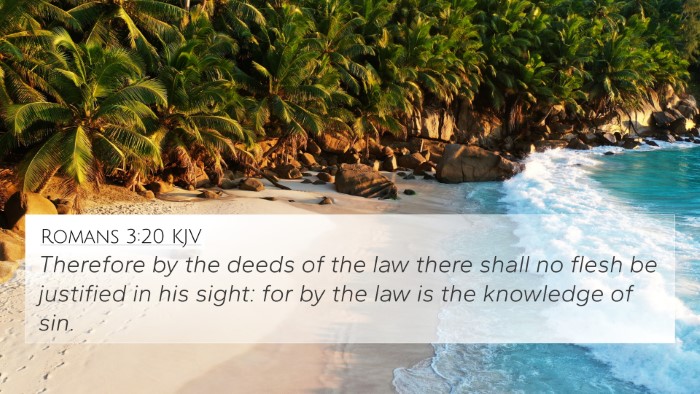
Romans 3:20 (KJV) »
Therefore by the deeds of the law there shall no flesh be justified in his sight: for by the law is the knowledge of sin.
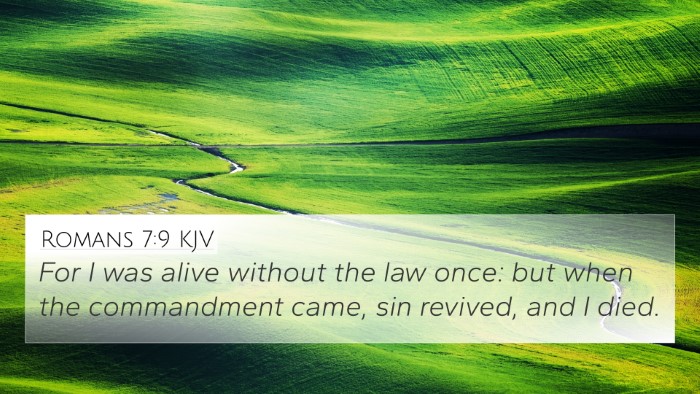
Romans 7:9 (KJV) »
For I was alive without the law once: but when the commandment came, sin revived, and I died.
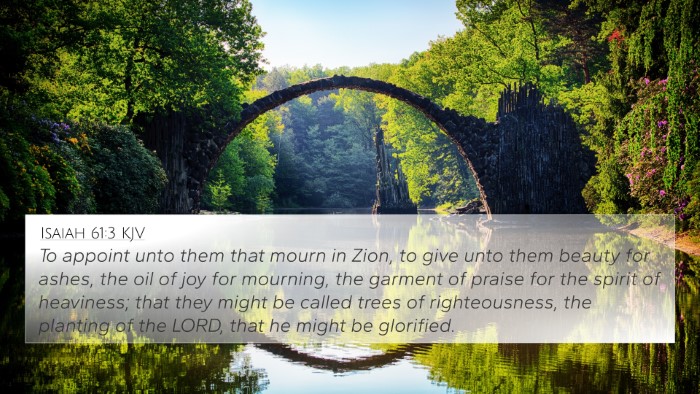
Isaiah 61:3 (KJV) »
To appoint unto them that mourn in Zion, to give unto them beauty for ashes, the oil of joy for mourning, the garment of praise for the spirit of heaviness; that they might be called trees of righteousness, the planting of the LORD, that he might be glorified.
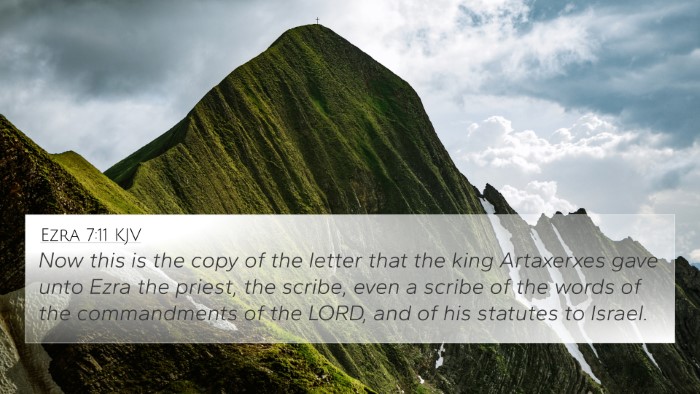
Ezra 7:11 (KJV) »
Now this is the copy of the letter that the king Artaxerxes gave unto Ezra the priest, the scribe, even a scribe of the words of the commandments of the LORD, and of his statutes to Israel.

Numbers 29:1 (KJV) »
And in the seventh month, on the first day of the month, ye shall have an holy convocation; ye shall do no servile work: it is a day of blowing the trumpets unto you.
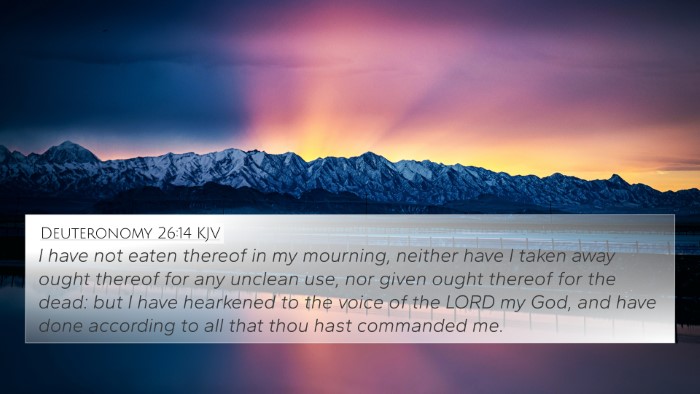
Deuteronomy 26:14 (KJV) »
I have not eaten thereof in my mourning, neither have I taken away ought thereof for any unclean use, nor given ought thereof for the dead: but I have hearkened to the voice of the LORD my God, and have done according to all that thou hast commanded me.
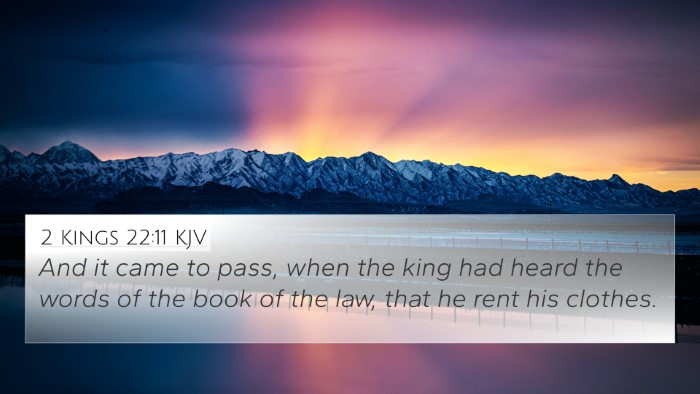
2 Kings 22:11 (KJV) »
And it came to pass, when the king had heard the words of the book of the law, that he rent his clothes.
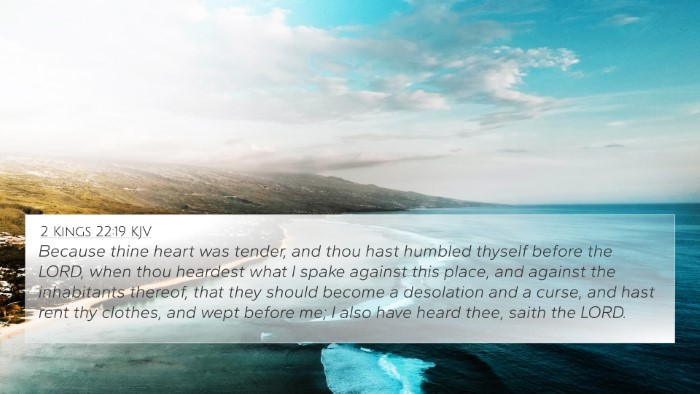
2 Kings 22:19 (KJV) »
Because thine heart was tender, and thou hast humbled thyself before the LORD, when thou heardest what I spake against this place, and against the inhabitants thereof, that they should become a desolation and a curse, and hast rent thy clothes, and wept before me; I also have heard thee, saith the LORD.
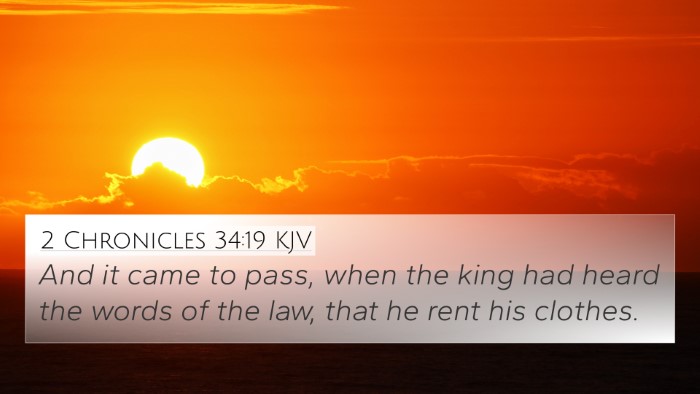
2 Chronicles 34:19 (KJV) »
And it came to pass, when the king had heard the words of the law, that he rent his clothes.
Nehemiah 8:9 Verse Analysis and Similar Verses
Understanding Nehemiah 8:9
In Nehemiah 8:9, we find a significant moment in post-exilic Israel where the people demonstrate their response to the reading of God's Word. This verse reads:
"And Nehemiah, which is the Tirshatha, and Ezra the priest the scribe, and the Levites that taught the people said unto all the people, This day is holy unto the LORD your God; mourn not, nor weep. For all the people wept, when they heard the words of the Law."
Verse Meaning and Context
This passage occurs after the Israelites returned from Babylonian captivity. They gathered to hear the Scriptures read by Ezra, which spurred a deep emotional reaction among the people as they recognized their shortcomings in following God's commandments. In their sorrow, Nehemiah and Ezra urge them to celebrate instead of mourning.
Insights from Commentaries
-
Matthew Henry:
Henry emphasizes the significance of the Law being read aloud, which provides spiritual nourishment and conviction. He interprets the people's weeping as a response to their recognition of sin, but notes that Nehemiah and Ezra call for joy as they acknowledge God's mercy.
-
Albert Barnes:
Barnes highlights the role of the leaders in guiding the people towards understanding the Word. He notes that the acknowledgment of the day's holiness indicates a divine appointment and encourages the people to find joy, reflecting on God's enduring compassion despite their failures.
-
Adam Clarke:
Clarke elaborates on the emotional impact of the scripture reading, noting that true repentance should lead to a transformation that includes joy in God's salvation. He underscores the cultural context of mourning that was common, yet stresses the importance of hope found in adherence to God’s Word.
Key Themes and Connections
The verse signifies profound themes such as:
- Repentance and Restoration: The crowd’s weeping reflects their need for repentance, a theme prevalent in both the Old and New Testaments.
- Divine Mercy: Nehemiah encourages the people to move from mourning to celebrating, mirroring the message of grace found in Christ.
- Holiness and Community Worship: As they gather, the idea of community worship and recognizing holy days is central, linking to Levitical laws.
Cross-References
This verse can be cross-referenced with several passages that highlight similar themes:
- Deuteronomy 31:10-11: The command for reading the Law yearly at the Feast of Tabernacles.
- 2 Chronicles 7:14: A call to humility and prayer, connected to the people’s response to God.
- Psalm 119:11: “Thy word have I hid in mine heart, that I might not sin against thee,” encouraging internalization of God's Word.
- Luke 4:18-19: Jesus reading from Isaiah in the synagogue, emphasizing joy and salvation.
- Romans 12:1: Offering our lives as living sacrifices in response to God’s goodness.
- Philippians 4:4: “Rejoice in the Lord always,” echoing the theme of joy amidst mourning.
- James 4:9: Encouragement to be “mournful” in repentance yet joyful in salvation.
The Role of Scripture in Transformation
This verse exemplifies the transformative power of Scripture. The communal experience of hearing the Word leads to emotional upheaval, which is redirected from despair to joy. This signifies not only personal repentance but also collective celebration in response to God’s redemptive plan.
Tools for Bible Cross-Referencing
For those looking to explore further the connections found within Scripture, various tools and techniques are available:
- Bible Concordance: A comprehensive reference that helps locate verses based on keywords.
- Bible Cross-Reference Guide: Useful for understanding parallels and connections.
- Cross-reference Bible Study: Methods appropriating thematic links within Scripture.
- Bible Reference Resources: Online databases and printed material designed for study and exploration.
Conclusion
Nehemiah 8:9 serves as a reminder of our reaction to God’s Word. While the initial response may be one of sorrow due to recognition of sin, it is essential to transition into joy and celebration of God’s grace. As we explore the Scriptures, especially through the lens of cross-referencing, we deepen our understanding of the interconnectedness of biblical themes and messages.
Final Thoughts
Engaging with the Bible through cross-referencing not only enhances our comprehension but also enriches our spiritual experience. As seen in Nehemiah 8:9, the Word of God calls us to reflect, repent, and ultimately rejoice in the love and mercy of our Creator.
